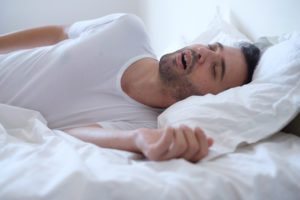
Snoring and feeling tired often go together. Because of this, many people who snore nightly believe that they are chronically tired because of their snoring. This may only be part of the picture. Snoring and excessive sleepiness are two of the primary symptoms of sleep apnea, a common sleep disorder. Here, we discuss what sleep apnea is and what might cause it.
Types of Sleep Apnea
Sleep apnea is the term that is often used to describe a cluster of sleep problems. All types of sleep apnea cause a person to stop breathing when they sleep. Obstructive sleep apnea, the most common form, occurs when the throat closes due to muscle relaxation in sleep. Central sleep apnea is caused by the misfiring of signals from the brain, preventing the muscles involved in breathing from knowing when to work. Complex sleep apnea is a condition that involves both an airway closer and neurological miscommunication.
Symptoms of Sleep Apnea
Snoring is only one sign of sleep apnea. Not every instance of snoring is an indication that breathing has stopped. Snoring is the sound that is made when air is passing through a narrowed airway. In sleep apnea, a person may snore very loudly and then stop. The pause in sound indicates that breathing has stopped. Then, when breathing resumes, the person may choke or gasp. Interestingly, though, they rarely wake up. Additional symptoms of sleep apnea include morning headaches, excessive daytime sleepiness, difficulty focusing on tasks, irritability, anxiety, and depression.
Causes
The most common type of sleep apnea, obstructive sleep apnea, is the direct result of obstruction in the airway. This is usually muscles. When we sleep, the muscles around the throat relax so much that they can press on the throat and prevent breathing.
Central sleep apnea is caused by a lack of proper signal transmissions from the brain to the breathing muscles. People with this type of sleep apnea often wake up feeling short of breath. They may have a hard time falling asleep or staying asleep.
Sleep apnea does not occur spontaneously. The condition is influenced by various factors. These include smoking or drinking alcohol, especially before going to sleep. People with allergies or anatomical abnormalities around the airway may also have a higher risk of sleep apnea. Some of the most common factors are obesity and thicker neck circumference.
To experience sleep apnea can be concerning. However, treatments have shown significant improvement in the vast majority of patients. To schedule your sleep apnea consultation in our St. Louis sinus center, call 314.395.0887. We also have a location in Festus, MO.

